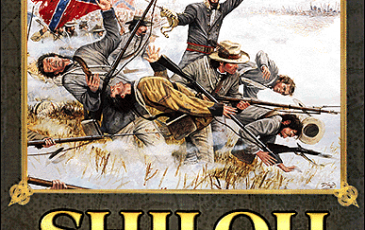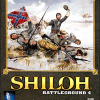17 Jul 61, Scarrytown, WV - Battleground 4: Shiloh

| Rating: | 7.3 (1) |
| Games Played: | 1 |
| SM: | 2 |
| Turns: | 15 |
| Type: | Custom |
| First Side: | Union |
| Second Side: | CSA |
| Downloads: | 73 |
17 July 1861, Scarrytown, WV [Curt Cabbage]
Three months into the Civil War, Union forces under Maj. Gen. George B. McClellan began a campaign to drive the rebel Confederate forces out of what was then Western Virginia. Due to his extensive political connections, and experiences at West Point and during the Mexican-American war, McClellan was commissioned as Major General in the regular army.
It quickly became apparent that McClellan and his forces were formidable. After victories in Barboursville, Ripley, Summersville, Rich Mountain and several others in the region, he ordered regiments under the command of General Jacob D. Cox to move into the Kanawha Valley and reopen the Kanawha River to navigation.
McClellan was confident, and assured his commanders of the eventual success of operations in Western Virginia. In a July 13th letter to his commander, McClellan wrote of his successes, the many P.O.W.'s he had taken thus far, and the places his forces were presently stationed. His last major task was to use Gen. Cox's forces to capture rebel regiments commanded by Gen. Henry A. Wise who had fled from McClellan in Ripley, and were currently holding positions throughout the Kanawha Valley.
"In that case, I should have accomplished the object of liberating West Virginia." McClellan wrote.
Less the military tactician, Wise was a lawyer and Democrat politician from Virginia. He had served in the United States Congress from 1833 - 1844. After his first election in 1832, he fought a dual with his competitor for the seat. Vice President James Tyler appointed Wise the United States Minister to Brazil from 1844 - 1847, and he was elected the 33rd Governor of Virginia in 1856 and served until 1860.
Although opposed to immediate secession, Wise was a member of the Virginia Secession Convention of 1861. When the commonwealth withdrew from the Union, Wise signed on with the Confederates and was commissioned a Brigadier General.
By early July of 1861, Wise and his forces had been driven out of Ripley, Virginia by McClellan's forces and holed up in the Kanawha Valley, where he was able to enlist the assistance of the Kanawha Riflemen, a volunteer unit led by Charleston lawyer George S. Patton Sr. (grandfather of the famous WWII General).
Wise knew he had a battle ahead of him, but he was determined. In a letter to his commanders, Wise wrote: "If I go toward Point Pleasant they rush on Coal, on Two-Mile, and the Elk and Gauley, and if I move out of the valley in any direction with anything like an effective force, they rush in and take the valley, and if I stand still they move from all sides and shut me in."
His forces were under-equipped as well. "My soldiers are raw, unequipped, not half armed and accoutered, untented, out of reach of clothing, unofficered and unorganized, yet they are prime personnel and fight well." Wise wrote. "We will fight hard, retire slowly if we must, and make a last stand at Gauley."
Fight hard he did. On July 16th, 1861, Cox moved his regiments, consisting of about 1200 men, into the Kanawha Valley as commanded. On the 17th, he met Wise, Patton and their forces of approximately 900 at the point where Scary Creek empties into the Kanawha River, just west of present-day Saint Albans, WV.
At first, the opposing forces traded rifle and cannon fire across the valley. The Confederates held the hill and valley to the east of the creek, and the Union troops gathered on the hill to the west. It soon became apparent that neither side was going to accomplish much from long distance, so Cox ordered his troops to fix bayonets and charge the bridge crossing the river.
The rebels met their charge, and pushed the Union forces back to their hilltop position. During the initial charge, Confederate troops bacame confused and thought that the Union had been successful in crossing the bridge, so they began to retreat. Gen. Patton, not about to allow a retreat, jumped on his horse and rallied the rebels. It was during this initial rally that a Union bullet found Patton, hitting him in his left arm. He would live to see many more days, but his moment on this battlefield was done.
The Union attempted several more charges on the bridge, being repelled each time. Finally, Cox realized defeat, and retreated his forces to the Pocotiglio River several miles away. In the heat of battle, the Confederates believed Cox had received reinforcements, so they too retreated. When it was found that Cox had done so as well, the rebel forces returned to the battlefield and claimed victory.
The battle had lasted just five hours, but it was the first major land victory for the Confederates. This incensed Gen. McClellan, who wrote to his commanders: "In Heavens name give me some general officers who understand their profession. I give orders and find some who cannot execute them unless I stand by them. Unless I command every picket and lead every column I cannot be sure of success."
The Confederate victory, although very important to the men who fought the battle, meant much less to the entire war effort. Gen. Cox did eventually receive his reinforcements, and drove Wise out of Kanawha Valley and into Gauley.
Three months into the Civil War, Union forces under Maj. Gen. George B. McClellan began a campaign to drive the rebel Confederate forces out of what was then Western Virginia. Due to his extensive political connections, and experiences at West Point and during the Mexican-American war, McClellan was commissioned as Major General in the regular army.
It quickly became apparent that McClellan and his forces were formidable. After victories in Barboursville, Ripley, Summersville, Rich Mountain and several others in the region, he ordered regiments under the command of General Jacob D. Cox to move into the Kanawha Valley and reopen the Kanawha River to navigation.
McClellan was confident, and assured his commanders of the eventual success of operations in Western Virginia. In a July 13th letter to his commander, McClellan wrote of his successes, the many P.O.W.'s he had taken thus far, and the places his forces were presently stationed. His last major task was to use Gen. Cox's forces to capture rebel regiments commanded by Gen. Henry A. Wise who had fled from McClellan in Ripley, and were currently holding positions throughout the Kanawha Valley.
"In that case, I should have accomplished the object of liberating West Virginia." McClellan wrote.
Less the military tactician, Wise was a lawyer and Democrat politician from Virginia. He had served in the United States Congress from 1833 - 1844. After his first election in 1832, he fought a dual with his competitor for the seat. Vice President James Tyler appointed Wise the United States Minister to Brazil from 1844 - 1847, and he was elected the 33rd Governor of Virginia in 1856 and served until 1860.
Although opposed to immediate secession, Wise was a member of the Virginia Secession Convention of 1861. When the commonwealth withdrew from the Union, Wise signed on with the Confederates and was commissioned a Brigadier General.
By early July of 1861, Wise and his forces had been driven out of Ripley, Virginia by McClellan's forces and holed up in the Kanawha Valley, where he was able to enlist the assistance of the Kanawha Riflemen, a volunteer unit led by Charleston lawyer George S. Patton Sr. (grandfather of the famous WWII General).
Wise knew he had a battle ahead of him, but he was determined. In a letter to his commanders, Wise wrote: "If I go toward Point Pleasant they rush on Coal, on Two-Mile, and the Elk and Gauley, and if I move out of the valley in any direction with anything like an effective force, they rush in and take the valley, and if I stand still they move from all sides and shut me in."
His forces were under-equipped as well. "My soldiers are raw, unequipped, not half armed and accoutered, untented, out of reach of clothing, unofficered and unorganized, yet they are prime personnel and fight well." Wise wrote. "We will fight hard, retire slowly if we must, and make a last stand at Gauley."
Fight hard he did. On July 16th, 1861, Cox moved his regiments, consisting of about 1200 men, into the Kanawha Valley as commanded. On the 17th, he met Wise, Patton and their forces of approximately 900 at the point where Scary Creek empties into the Kanawha River, just west of present-day Saint Albans, WV.
At first, the opposing forces traded rifle and cannon fire across the valley. The Confederates held the hill and valley to the east of the creek, and the Union troops gathered on the hill to the west. It soon became apparent that neither side was going to accomplish much from long distance, so Cox ordered his troops to fix bayonets and charge the bridge crossing the river.
The rebels met their charge, and pushed the Union forces back to their hilltop position. During the initial charge, Confederate troops bacame confused and thought that the Union had been successful in crossing the bridge, so they began to retreat. Gen. Patton, not about to allow a retreat, jumped on his horse and rallied the rebels. It was during this initial rally that a Union bullet found Patton, hitting him in his left arm. He would live to see many more days, but his moment on this battlefield was done.
The Union attempted several more charges on the bridge, being repelled each time. Finally, Cox realized defeat, and retreated his forces to the Pocotiglio River several miles away. In the heat of battle, the Confederates believed Cox had received reinforcements, so they too retreated. When it was found that Cox had done so as well, the rebel forces returned to the battlefield and claimed victory.
The battle had lasted just five hours, but it was the first major land victory for the Confederates. This incensed Gen. McClellan, who wrote to his commanders: "In Heavens name give me some general officers who understand their profession. I give orders and find some who cannot execute them unless I stand by them. Unless I command every picket and lead every column I cannot be sure of success."
The Confederate victory, although very important to the men who fought the battle, meant much less to the entire war effort. Gen. Cox did eventually receive his reinforcements, and drove Wise out of Kanawha Valley and into Gauley.
| Player Voting Stats | ||
|---|---|---|
| Member | Balance | Enjoyment |
| Slightly Pro CSA | 6 | |
| Gaming Records | |||||||||
|---|---|---|---|---|---|---|---|---|---|
| 1st Side Player | 2nd Side Player | Result | Score | ||||||
 |
Mr. Guberman | vs. | Prairie Flower |  |
Union Minor Loss | 8 | 20 | ||





















